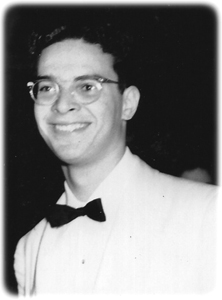

Pianist, conductor, recipient of the 2007 Kennedy Center Honors award
(1928– )
For some reason music had a certain importance to my mother. She saw that music seemed to be not only a path to a better life but also that it was part of the human soul to which one should aspire. I can’t remember a time in our apartment when there wasn’t this little upright piano.
My older brother, Raymond, was given piano lessons but was not particularly interested. In those days, music teachers and doctors both made house visits. Whenever the teacher came to give Ray a lesson I was absolutely fascinated. I would curl up on the couch in the corner and just watch and listen. When the lesson was over, Ray would go out to the school yard and play with his friends. I would go over to the piano and repeat everything that had been done in the lesson; and apparently did it with much greater enthusiasm and alacrity than he did. I must’ve been four or four and a half. It turned out that Ray was very happy to let me take over his lessons so that he could spend more time in the school yard.
I enjoyed it. It was great fun. I think that it was one of those extraordinarily lucid moments when a mother’s vision for a child actually coincided with the talent of the child. I had two choices. First choice was to become the first Jewish president of the United States. Second choice, become a famous musician. As I said, it was one of those rare serendipitous occasions where the dream and the reality seemed to coincide.
There came periods of time when I became bored with practicing because you have to develop certain neuromuscular responses which come about only as a result of a certain amount of repetition. I became master of being able to practice something and read a book at the same time. The only problem was hiding the book when my mother came by. I learned how to do that by slipping the book under one leg when I heard her footsteps.
I had just turned ten in 1938 when my mother and I, in effect, abandoned my father and brother in San Francisco, where my brother and I were born. My mother and I left for Lake Como, Italy, where Artur Schnabel, this world-famous, incredible teacher, taught. Schnabel had accepted me as a student. He had also discovered Lake Como long before George Clooney. It’s a paradise on earth. Beautiful lakes surrounded by mountains.
I went some four months in the summer to work with him. War clouds were gathering, and Schnabel was making plans to leave Lake Como. He was going to move to New York, and if I wanted to continue working with him it made sense that my family move to New York too. So we came back from Lake Como in September. We lived on West Seventy-Ninth Street in a brownstone while looking for another, larger apartment. My father and brother joined us in New York, and I think it was toward the end of 1938 that we found an apartment at 1325 Grand Concourse in the Bronx. Our apartment faced south, the side street, which had two sides lined with cars but certainly enough room to have a rather constricted game of stickball, which was a kind of nonstop affair.
When I wasn’t practicing, or doing my homework, I might be down there playing stickball. It’s a great game. One of our great players was called Sluggo. The pink Spaldeen was hit onto the Grand Concourse itself by him. I forget the name of the street to the west of us, but Sluggo could hit that ball a country mile in the heart of the Bronx.
Around 1939 or ’40 there was this lovely, ample-bosomed blonde girl who was my older brother’s girlfriend. Her name was Natalie. She lived across the little side street on which we played stickball. The room that held my piano, my studio, if you will, faced her windows. We were up on the fifth floor, and Natalie was across the street on the second floor. There were a number of times in the summer when Ray, my brother, threw open the window, sat on the sill with his leg up, and Natalie would be like Juliet, except she was below, not above, at her window. The two would gaze and gesture to one another. It was quite a distance from the fifth floor to the second floor across the street, and, you know, with kids in between playing stickball, it wasn’t quite the situation where they could converse. So they developed a kind of sign language.
One afternoon, Ray must’ve been in the throes of some great wave of passion. He sat me down, literally grabbed me by the arm, and put me on the piano bench. He knew that I could play the piano version of Tchaikovsky’s Romeo and Juliet. He pointed to the music and said, “Play!” Then he went and sat on the sill while I played as loudly as I could, with the appropriate feeling. I played this love music while my brother sat on the sill making these great swooping gestures as if he were sending the music out the window down across the street to Natalie’s window. I was twelve or thirteen and Ray was close to eighteen at the time. I felt like Cyrano de Bergerac. A musical Cyrano de Bergerac.